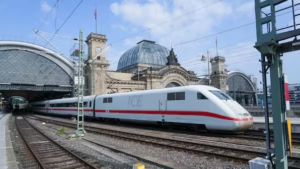Von Georg Moeritz
Freiberg. Lässt sich die Freiberger Solarmodulfabrik noch retten, auch wenn die Bundesregierung nicht den Wunsch des Unternehmens Meyer Burger nach einem Bonus für hiesige Produkte erfüllt? Der Mittelsachsen-Landrat Dirk Neubauer (parteilos) arbeitet an einem Plan, der die verlustreiche Produktion wieder anschieben soll.
Neubauer will Details seines Vorhabens nächste Woche vorstellen und mit Meyer-Burger-Konzernchef Gunter Erfurt abstimmen. Der Landrat sagte im Gespräch mit sächsische.de, im Kreis Mittelsachsen sollten eine Projektgesellschaft und lokale Betreibergesellschaften für Solaranlagen gegründet werden. Sie könnten Fotovoltaik-Module aus der Fabrik kaufen und anschließen. So würden zusätzlich zu den Stadtwerken lokale „Landwerke“ entstehen.
Meyer Burger hatte Mitte März die Produktion eingestellt und den meisten der 500 Beschäftigten die Entlassung zum Ende April angekündigt. Am Dienstag haben 400 von ihnen die Kündigung erhalten, wie der Grünen-Landtagsabgeordnete Daniel Gerber mitteilte. Der Betrieb sitzt auf Solarmodulen mit einer Leistung von 365 Megawatt, die sich wegen chinesischer Billigkonkurrenz kaum verkaufen lassen. Die Freiberger Produktion machte laut Konzernchef Erfurt Verluste, der Aktienkurs des Schweizer Konzens ist in den vergangenen Tagen auf 0,02 Schweizer Franken gefallen. Er lag mal bei 0,71 Franken. Ein Teil der Beschäftigten soll Angebote an anderen Standorten des Konzerns bekommen.
Plan für Mittelsachsen: ein Gigawatt Solarleistung
Geht es nach Landrat Neubauer, werden bald in Mittelsachsen rund 50 mittelgroße Solaranlagen aufgebaut. „Es kann gelingen, wenn Kommunen und Bürger mitmachen“, sagte er. „Flächen sind genug da.“ Auf rund 1.000 Hektar ließen sich Module mit einer Gesamtleistung von rund einem Gigawatt aufstellen, so Neubauers Rechnung. Das sei etwa eine Jahresproduktion der Freiberger Fabrik. Das Unternehmen habe zugesagt, dafür die Produktion wieder anzufahren.
Die Kosten für die Investitionen im Kreis Mittelsachsen einschließlich Bau und Betrieb veranschlagt der Landrat auf 770 Millionen Euro. Das sei ein Konjunkturprogramm für die regionale Wirtschaft, auch für das Handwerk. Die Sparkasse Mittelsachsen habe zusagt, Teilprojekte zu finanzieren, auch Volksbanken wollten die Idee wohlwollend prüfen.
Der Landkreis selbst könne sich nicht direkt beteiligen, habe aber die wohl größte Aufgabe in diesem Projekt: „Wir als Kreis müssen eine Planungsbeschleunigung hinkriegen.“ Dafür benötige er auch die Unterstützung der Landesregierung, sagte Neubauer.

© Lutz Weidler (Archivfoto)
FDP-Chef Lindner: Solarmodule kein Hightech
In den vergangenen Wochen hatten sich Landespolitiker von CDU, Grünen und SPD für eine Unterstützung der Branche eingesetzt. Die Unternehmen Meyer Burger, Solarwatt in Dresden und Heckert Solar in Chemnitz forderten gemeinsam mit einem Branchenverband einen „Resilienzbonus“. Europäische Technik sollte demnach bevorzugt werden, auch wenn sie teurer sei als chinesische. Die werde zu Preisen unter den Herstellungskosten angeboten, das sei unfair.
FDP-Parteichef Christian Lindner sprach sich gegen den Bonus aus. Er sagte in der ARD-Sendung Bericht aus Berlin, die Fertigung von Solarmodulen sei „keine Hightech-Technologie“. Einzelne Unternehmen zu fördern wirke sich nicht auf die Sicherheit des Wirtschaftsstandorts aus und auch nicht auf das Gelingen der Energiewende. Landrat Neubauer dagegen bezeichnete die Solarindustrie als eine „Zukunftsbranche“, die von der FDP aus parteipolitischen Gründen vertrieben werde.
Energieminister Günther: Von China unabhängiger werden
Sachsens Energie- und Umweltminister Wolfram Günther (Grüne) nannte die Branche „strategisch bedeutsam“. Die FDP liege falsch mit der Aussage, Fotovoltaik sei kein Hightech. Vielmehr führe deutsche Forschung zu leistungsstärkerer Solartechnik. Jedes Prozent mehr Wirkungsgrad der Solarzellen, jeder Vorsprung bei der Lebensdauer bedeute einen erheblichen Vorsprung am Markt und bei den Kosten für die Stromerzeugung. Als sächsischer Energieminister halte er fest an dem Ziel, von China möglichst unabhängig bei der Versorgung mit Technologien zur Erzeugung erneuerbarer Energien zu bleiben.
Günther forderte, nach der Absage aus Berlin müsse nun die EU rasch ihre geplanten Förderprogramme vorantreiben. In Brüssel wird eine Wirtschaftsförderung unter dem Titel Net Zero Industrial Act vorbereitet. Diese Instrumente müssten nun schnell konkretisiert und national in Kraft gesetzt werden. Sachsen könne mit einer Fachkräfteinitiative und mit einer Initiative bei Forschung und Entwicklung nach vorne gehen und punkten. Die Kündigungen in Freiberg seien eine harte, bittere Nachricht für die Mitarbeitenden und ihre Familien.
Der CDU-Landtagsabgeordnete Robert Clemen schrieb, die FDP werde als „Totengräber der deutschen Solarindustrie“ in die Geschichte eingehen. Er erinnerte daran, dass andere Hersteller dem Beispiel von Meyer Burger folgen könnten. Solarwatt in Dresden hatte zum Jahreswechsel bereits Mitarbeitern gekündigt. Geschäftsführer Detlef Neuhaus sagte im Januar, Solarwatt sei nicht gefährdet, aber die Produktion mit 120 Arbeitsplätzen in Dresden. Clemen warf der Bundesregierung vor, wieder sei „eine Entscheidung mehr gegen die ostdeutsche Wirtschaft“ getroffen worden.








